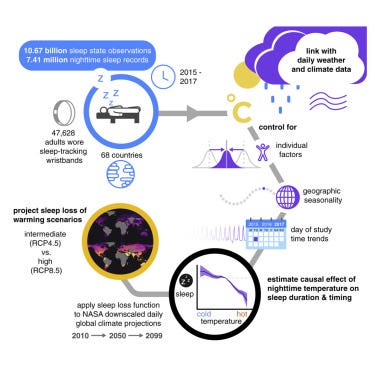I was asked this question the other day: "Is science becoming stupider?"
I was forced to answer this way: "Boy, howdy! Science will be lucky to reach stupid the end of the next decade if it starts studying full time right now."
Yes, it was I who asked the question of myself. But that doesn't make the answer any less true or important.
And I can prove it. Using the peer-reviewed scientific paper "Rising temperatures erode human sleep globally” in One Earth by Kelton Minor (which sounds like the name of a the dimmer of a binary star) and some others.
Here's the Summary, with my emphasis and paragraphifications:
Ambient temperatures are rising worldwide, with the greatest increases recorded at night. Concurrently, the prevalence of insufficient sleep is rising in many populations. Yet it remains unclear whether warmer-than-average temperatures causally impact objective measures of sleep globally.
Here, we link billions of repeated sleep measurements from sleep-tracking wristbands comprising over 7 million sleep records (n = 47,628) across 68 countries to local daily meteorological data. Controlling for individual, seasonal, and time-varying confounds, increased temperature shortens sleep primarily through delayed onset, increasing the probability of insufficient sleep.
The temperature effect on sleep loss is substantially larger for residents from lower-income countries and older adults, and females are affected more than males.
Those in hotter regions experience comparably more sleep loss per degree of warming, suggesting limited adaptation.
By 2099, suboptimal temperatures may erode 50–58 h of sleep per person-year, with climate change producing geographic inequalities that scale with future emissions.
Wow! Fifty eight hours of lost sleep in a year! And women and minorities hardest hit!
"Say, Briggs, before you get too excited. How many days in a year?"
Same as always, a bit more than 365.
"So, worst case scenario, how much sleep will be lost on average daily per person?"
Let's see. That's 58 hours divided by 365.25, which is 0.158-something hours a day.
"How many minutes is that?"
Easy: 0.158 hours * 60 minutes/hour = 9 minutes. A day. Roughly. Or 8 if the 50 hours figure is correct.
"Dude. Even if global warming terrorizes us all, in the absolute most horrible scenario they can think of, and of course people forget they have air conditioning and fans, they might lose a full nine minutes of sleep a day in 2099? And they wouldn't be able to figure out a way to get that back? The temperature would act like an alarm bell or something?"
It's science!
Come to think on it, the number 58 is even screwier than we thought. Seems that most of the warming that is coming in global warming---it will get here any year now---will happen in higher latitudes in winter (northern and southern hemispheres), where an extra degree or two might be nice, especially in the winter. Might help some folks sleep better.
On the other hand, maybe Minor binary thought of that. I don't have access to the paper, so I can't tell. (Science is best done by restricting papers to academic faculty.)
But I do have access to the news report on the paper, in which Minor binary has some quotes.
Minor binary: "In order to make informed climate policy decisions moving forward, we need to better account for the full spectrum of plausible future climate impacts extending from today’s societal greenhouse gas emissions choices."
He could have said, "We need to figure what's going to happen", which is equivalent, but doesn't sound nearly scientific enough.
This struck me:
To conduct their study, the researchers used anonymized global data collected from sleep-tracking wristbands...
Measures from these types of wristbands, the authors explained, had previously been shown to align with other independent measures of wakefulness and sleep.
Say what? Sounds like we're in the realm of the epidemiologist fallacy. It's like they didn't measure sleep, but some kind of number from wrist band which is correlated with sleep.
Then, surely, came wee p-values. I'll let readers confirm that.
If I'm right about both the epidemiologist fallacy and the p-values, it means that the conclusion is far too certain. For if we "integrate out" the uncertainty due to the correlation, which is not the actual sleep measurement, and then we look at it predictively, instead of by wee p-values, then that 9 minutes will fall even more. Or be a heck of a lot more uncertain.
And even if I'm wrong about the epidemiologist fallacy and the p-values, it's still only a lousy nine minutes a day.
On average.
Good grief.
Buy my new book and learn to argue against the regime: Everything You Believe Is Wrong.
Visit wmbriggs.com.





If we sleep less, we can do more science. If the average sciencey paper takes about 900 minutes to write (very uneducated guess, but makes the computation easier), humanity can produce 80 million more of these per day, or 29 billion per year.
We are headed toward Isaac Asimov's Galactic Empire, where science is the ritualized province of the tech men, who have collectively forgotten more than they know, and where the doctors of the time cannot count a pulse beat without a book of the ancients. This was scientism in the "Foundation" novels, and that is the sect of secular humanism now becoming predominant in the First American Republic, which is in about the same shape as the future planet Trantor.